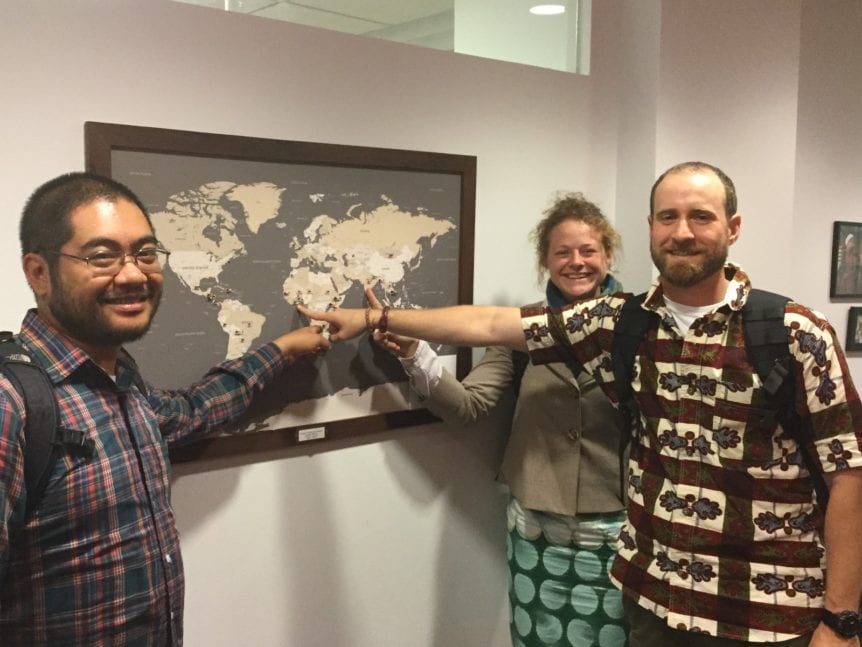For the next installment in our series on the Leland International Hunger Fellows and their policy placements, we turn to Carlo Abuyuan, placed with FHI360 in Zambia and Washington, D.C.
Policy Placement
For my policy year I am based in Washington DC with FHI360. FHI360 is a non-profit organization that is dedicated to improving lives through integrated and locally derived solutions. I continue to support the LIFT II program, bringing my experience in Zambia to my work. Also, I am acting as the livelihoods specialist for the Malawi DREAMS project.
The LIFT II project strengthens referral networks, which include different community and government entities, to improve the well-being of vulnerable populations such as people living with HIV/AIDS, orphans and vulnerable children, and malnourished community members. The project connects them to economic strengthening services to help them manage their health and shocks, and build their resilience.
The Malawi DREAMS project works to address the barriers that may prevent girls from attending secondary school. The project addresses barriers holistically and focuses on both girls and the community. The highly integrated and multi-faceted project focuses on financial, health, educational and cultural barriers. I work on addressing financial barriers by improving the communities’ income, while also ensuring behavior change messages are integrated in trainings to promote girls’ education.
What Makes Good Food Security Programming?
When thinking of good food security programming, often one thinks immediately of direct food aid and agricultural/livestock related projects. However, projects can still promote food security if interventions are designed with food security in mind.
For health projects that focus on resilience of vulnerable populations, considering food security frameworks is vital. Poor and very poor populations often spend more on purchasing food, and changes to their income due to health shocks can cause food insecurity. Good food security programming needs to work across various sectors including health, agriculture, and nutrition for it to work effectively, since changes in one sector can affect the other. However, in resource-constrained contexts, collaboration is generally agreed upon, but often never carried out. Understanding motivations and incentives for multi-sectoral collaboration is key to make it all work.
How Does Your Field Experience Tie Into the Work You’re Doing Now?
Understanding that some interventions are more effective based on specific vulnerable criteria has been invaluable. Besides developing referral networks in Zambia, LIFT II also strengthened community members’ capacity to support economic strengthening services such as Savings Groups. Providing referrals to specific vulnerable populations based on clinical criteria has provided me insights on the challenges and solutions of linking vulnerable populations to external services such as economic strengthening.
Being in the field also helped me understand effective targeting in program design. Now, when considering which population we are trying to target, I’m thinking about how effective can the intervention be, and how do we make the most impact within the realities of procurement, donor priorities and the goals of the project. Since my work on economic strengthening has focused primarily on Savings Groups, I look at how Savings Groups can potentially exclude vulnerable populations. Though not all vulnerable populations should be part of Savings Groups, there are some which can benefit and may be excluded due to social stigma, or self-regulating policies that favor richer members and larger share-outs.
How has your perspective on development has changed since coming to Washington?
Relationship-building and clarity are of key importance in development. Though often we think this only applies to project stakeholders and beneficiaries, these also apply to staff relationships, especially in remote management. Empathy and field experience can help HQ to build relationships with staff and clear up misunderstandings that might impede a project from meeting its goals. However, projects still need to balance donor priorities and ensure targets are met. My perspective of HQ management of field projects has changed considerably. HQ managers often need to be empathetic, patient and still meet project targets. Additionally, they need to balance management to empower field staff but at the same time not micromanage. It poses challenges that I never considered when I was in the field.

